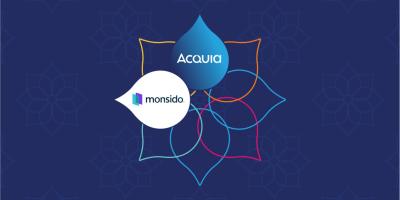
Celebrating 10 Years of Acquia Engage: Day One Highlights

The falling leaves and crisp autumn morning welcomed digital innovators, marketers, and practitioners to Engage Boston for the first stop of the 2023–2024 Digital Freedom Tour. And, as the event title suggests, attendees were energized and ready to engage and network with their peers, sharing the digital experience (DX) challenges and successes they’ve encountered. Marking the 10th anniversary of Acquia Engage, the conference started with big news: Acquia’s agreement to acquire Monsido and the expansion of Acquia DXP through strategic partnerships with Conductor and VWO.
We’ll hear more about these announcements during the Innovation Showcase of the two-day event, so let’s start with the day one highlights.
Hands-on learning in workshops
To kick off the jam-packed event, we started with specialized workshops.
- For marketers and business leaders: delivering DX
- For technical doers: the latest and greatest in Drupal
- For content strategists and digital asset managers: addressing marketing trends using digital asset management (DAM)
- For marketers: the transformative role customer data platforms (CDPs) have played in elevating data-driven strategies.

In a Barbie-themed workshop on the marketing cornerstones of DX, Judd Mercer from Elevated Third walked through how to fill out a personalization primer worksheet for attendees’ own organizations. The worksheet helped them to put into words their value proposition, identify key customer segments, craft nuanced and relevant messages for those segments, map the customer journey, and develop a hypothesis to test with a personalization strategy.
The CDP Carnival workshop recapped the latest evolution of cookie policies and how that has impacted organizations’ ability to do data-driven marketing and given rise to CDPs. After a brief history of customer data management technologies and the different types of CDPs, we then took a deep dive into Acquia CDP and client use cases. One useful reminder from Young Pham of CI&T was that nobody starts with all of their customer data already in a CDP and accessible to enact upon. Start small and your data, as well as your activation of it, will expand over time.
Matt Korostoff from FFW presented on how to incorporate artificial intelligence (AI) into a Drupal site as part of the Drupal for Technical Doers workshop. He defined a good AI use case as one that tolerates imprecision, processes large volumes of data, and cannot be done with conventional software before explaining the tools, technologies, and processes used to achieve these AI end results.
In the Smart Assets workshop, attendees got hands-on with a metadata optimization worksheet to help evaluate if their DAM metadata is helping or hindering users searching for assets. They also received an overview of the brand management tools and tips to drive DAM success. Acquia’s Jake Athey ran through how to use DAM technology for brand creation, curation, governance, and activation, showcasing Acquia DAM customers that exemplify best practices in action. For example, to demonstrate different use cases for portals, we saw portals from T-Mobile, McCormick, Mercury, and Meta; all use portals to curate content for different sub-brands, regions, events, and more.
Immersive mainstage presentations
After the workshops, we immersed ourselves in an afternoon of exciting content, starting with an overview of changing digital engagement habits by Dries Buytaert, Acquia co-founder and chief technology and strategy officer, and Jennifer Griffin Smith, Acquia CMO. Dries and Jen shared how declining trust in brands, the overwhelming increase in content, expanding expectations from consumers, and the accessibility imperative has driven CMOs and CTOs to work even closer together. The results of the newly released Acquia Customer Experience Trends Report, which found that only 37% of marketers believe they can build digital experiences without IT assistance, reinforce the idea of marketing and IT collaborating.
The day continued with one of the most popular parts of Engage: the opportunity to hear directly from innovative brands about their transformation stories. Acquia customers Brian Clark from Rhode Island School of Design (RISD), Kaarthik Subramaniam from Mars, and Josh Soldo from Fidelity Investments participated in the digital experience customer panel and shared their transformation journeys and lessons learned along the way.
Kaarthik shared Mars’ evolution from 2020, when the company needed to solve for a large, disjointed digital ecosystem, to now in 2023, when they’ve migrated over 300 brand properties across 58 brands into a connected ecosystem where they can manage brand compliance and accessibility.
Brian could commiserate. RISD faced a similar situation where the college lacked governance rules for how websites could be generated, resulting in over 100 websites across different offices that presented a fragmented experience and exposed them to technical risk and accessibility issues. Brian shared how they built a branded component-based system for Drupal to reorganize content, instill consistency, and help create more user-focused experiences across their ecosystem.
In terms of where the journey goes next, Josh shared that Fidelity is in the early stages of bringing in digital asset management and headless content management, as well as exploring AI in terms of both content generation and possibly even code writing. While Josh is not too concerned with the noise about robots taking over the world, he did note the inevitability of AI.
And while we’re on the topic, AI permeated the Engage Boston agenda. Paul Roetzer, CEO and founder of the Marketing AI Institute, discussed what we need to know about AI. While AI is a discipline that started in the 1950s, most of us haven’t had access to it until the last 12 months. The idea of AI replacing manual labor is misguided, however; it’s actually coming for knowledge workers. Paul predicts that in the next one to two years, 80% of what knowledge workers do every day will be AI-assisted to some degree. Given this, Paul advices organizations to take the following steps now to build AI-native and AI-emergent businesses:
- Focus on education and training
- Create an internal AI council
- Develop responsible AI principles and generative AI policies
- Conduct an AI impact/exposure assessment for your teams
- Build an AI roadmap
To keep the AI ball rolling, Bounteous’ Jon Meck also spoke about the innovation and value afforded by AI in his keynote. To him, AI’s three promises are to make us more productive, to make us better, and to add business value. But to take advantage of these promises, you need three initialisms (which Jon taught us are different from acronyms!):
- POC: proof of concept. You just need to get started.
- COE: center of excellence. An AI COE or AI council needs to be cross-departmental, not just IT or marketing.
- SME: subject matter experts. Note that there aren’t that many out there.
But the highlight of the afternoon was the keynote from Haben Girma, the first deafblind graduate of Harvard Law School and a renowned disability rights advocate. Haben wowed the room with her lessons on how constraints, whether a physical disability or financial hardship, can spark innovation and creative solutions that end up helping everyone — including those without disabilities. Haben shared how she challenged ableism throughout her life and how those small advocacies went on to help others. From bringing her Braille keyboard to loud, dark, dingy bars in Boston to communicate with her classmates to getting her college dining hall to email accessible menus, Haben found that solutions that include her in the experience ended up making an impact for the community at large.

The main takeaway from Haben’s keynote? Disability drives innovation. She reminded the crowd that any experience can be made accessible when you’re thoughtful and creative. In another example of how innovations driven with accessibility in mind actually end up helping more than just individuals with disabilities, Haben explained how curb cuts originated in the 1960s in Berkeley to assist those using wheelchairs, but today, skateboarders, parents with strollers, and even autonomous delivery robots use and benefit from the curb cuts.
So, when you design for accessibility, you design for everyone. But remember: Inclusion is a choice. You have to choose to adapt your communication and your tools to ensure they’re fully accessible.
The excitement continues . . .
The launch of Acquia TV and celebration of the Engage Award Winners further bolstered Engage Boston. That energy continued all day throughout the Partner Pavilion, where attendees could meet our amazing sponsors, grab swag from the Acquia claw machine, customize a screenprinted Acquia T-shirt, tag the digital graffiti wall, get their “Acquiascope” read, or get their photo taken in a 360-degree photo booth. While the day closed out with our welcome reception, the connections and celebrations didn't end there. We’ll be back at it for day two with the much-anticipated Innovation Showcase, more stories from brands, and four tracks of breakout sessions!




